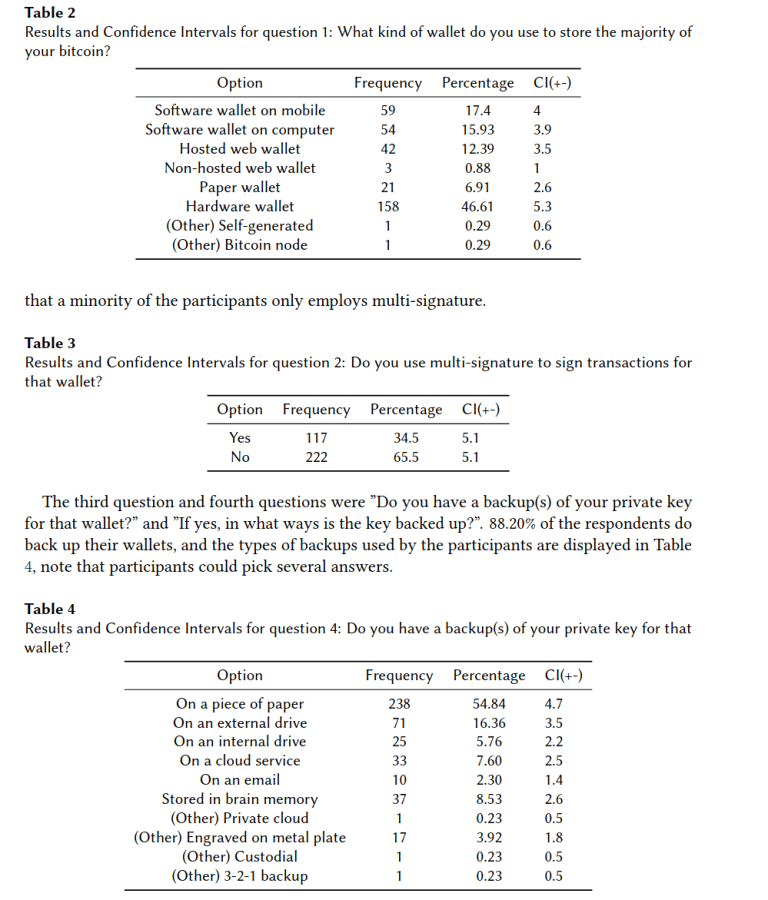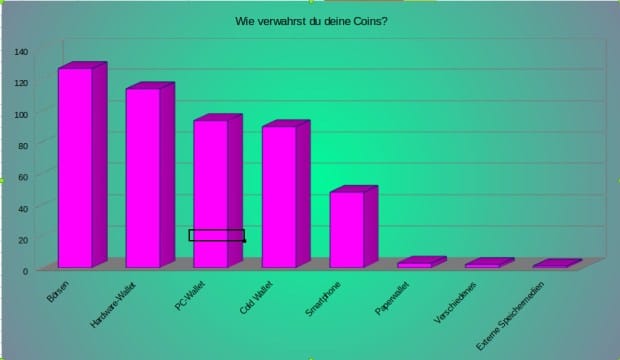Four researchers from Sweden ask a few hundred Bitcoiners how they store their coins. The results are interesting and in some cases startling.
Most studies that appear on Bitcoin are boring. Usually it’s about the price, and the researchers try to predict it using various machine learning algorithms. Yawn.
So it’s all the nicer when a study deals with a topic that goes to the heart of Bitcoin: How do users store their coins?
Because, write four researchers from the University of Skövde, a small town in northeastern Sweden, it is precisely those “fundamental characteristics of trustless, hard and safe money that make Bitcoin attractive. But one result of Bitcoin’s immutability is that users can lose money if they make security mistakes, such as losing their private key.” Therefore, storing Bitcoins properly is essential.
The researchers conducted a survey with 339 Bitcoin users to “explore how individuals interact with Bitcoin technology to secure their private keys.”
The paper is delightfully brief and specific, but does introduce some concepts. The researchers understand Bitcoin as a “social-technical system (STS)”, i.e. a kind of hybrid system of humans and technology, a kind of social cyborg. Bitcoin consists “of the dynamics of human, social, organisational and technical components.” The link between humans and technology is the wallet, which allows private keys to be managed. These private keys are necessary to spend Bitcoins. Whoever owns them owns the coins.
The choice of wallet is, according to the researchers, “essential. There are different types of wallets, and they differ in their user-friendliness and security.” These two characteristics are partly opposed: more security often comes at the expense of user-friendliness, and vice versa.
But how do users decide? Do they understand Bitcoin well enough to make competent decisions? This is what the researchers find out with a survey.
Software or hardware? Web or paper?
First, the paper lists the common wallets as well as their security, user-friendliness and costs: software, web, paper and hardware wallets.

Software and web wallets are user-friendly but not very secure; hardware and paper wallets, on the other hand, are secure but less user-friendly. Hardware wallets may have a particularly favourable balance between user-friendliness and security.
To find participants, the researchers pointed out the survey on the Reddit forum r/bitcoin. In it, they asked five questions:
1) What type of wallet do you use to store the majority of your Bitcoins?
2) Do you use Multisig to sign transactions with this wallet?
3) Do you have backups for your private keys?
4) If yes, in what way did you generate the backup?
5) Is your backup encrypted?
The questions are quite simple, the results quite interesting. What do you think – which category wins? Which wallet is used most often?
The results
339 users took part in the survey. They answered the first question very clearly: 46.6 percent of the users use a hardware wallet. In second place, with a good 30 per cent, were “software wallets that are either stored locally on a mobile phone or a computer or on a web server”. This is followed by web apps with a good 12 percent; paper wallets bring up the rear with just under 7 percent, which is surprising because paper wallets are considered the most secure type of wallet.
To the second question – whether users use multisig – an astonishing 34.5 percent answered yes. Although it is unclear how many of these 34.5 percent use hardware wallets, one could assume that a setup with multiple hardware wallets is not at all uncommon.
To the third question, almost 90 percent answered that they have a backup of their private keys. This in itself is unsurprising, as most wallets require users to prove they have a backup when they go live, usually in the form of a lake of 12 to 18 words. Most often, users write the backup on paper (54.8%). This is followed by backup on external media (16.4%) and hard drives (5.7%). This can also include complete wallet files, such as are usually necessary for full nodes. Surprisingly, at 8.5 per cent, almost one in ten trust their memory well enough to use a brain wallet as a backup, while only 7.6 per cent trust their backup to the cloud. Finally, 3.9 percent use metal disks, which is considered the most secure option.
A good 40 percent of users encrypt their backups, which is a surprisingly high figure. This is because only wallet files, such as those stored on external data carriers or hard drives, can be encrypted without difficulty, while the effort required for paper, metal and memory backups is likely to be relatively high.

Bitcoiners protect their coins more carefully than normal data
From the results of the survey, the researchers learn that Bitcoin users are “security-conscious when it comes to their private keys, and they are especially careful about backups.” The users understood that losing their private coins would be like losing their keys, and one might add: They also have the technical competence to choose the right wallet for them from a wide range of possible wallets.
Hardware wallets are chosen by so many users because “they are considered to have the best balance between security, functionality and availability.” Software wallets, on the other hand, have the advantage of being free and more versatile, while web wallets are probably used mainly by traders on exchanges. This group seems to be somewhat underrepresented in the survey.
Overall, the survey gives the impression “that users protect their Bitcoins more carefully than regular data.” This is obvious and, above all, shows that users understand Bitcoin to some extent. The low rate of multisig – especially compared to backups – is explained by the fact that “Bitcoin users want to make sure they can spend their Bitcoins, rather than having to deal with multiple keys to sign them. But it may also be due to the technical difficulty usually associated with multisig, they say.
It should be mentioned that the study is not perfectly representative. The researchers themselves admit that: “The significance of the paper is limited by the fact that the survey does not reach many users who are not actively looking for information about Bitcoin. The reason is that the survey was published in a forum for Bitcoin users. People who use forums tend to be interested in the topic and invest time in learning about it. In addition, posts on the forum can influence users in their choice of wallets and backup methods.”
Indeed, r/bitcoin is a relatively ideologically charged forum: Users fixate on Bitcoin and are rather ascetic about other cryptocurrencies; the credo “Not your Keys, not your Coins” is often preached here. Both could explain why the participants in the survey hardly use webwallets, but surprisingly often multisig and encrypted backups. The r/Bitcoin users are above average ideologically and, thus conceding, informed.
A comparison with another survey
To actually be able to classify the results, further surveys in other environments would therefore be necessary.
The only one I have at hand off the top of my head is from our 2019 blog, in which I asked you how you manage your coins. The differences with the Swedish researchers’ findings jump out at you.

Counting PC and mobile wallet together, the self-managed wallet is the most used. It is followed by the web wallet – called an exchange here – and then the hardware wallet. The high proportion of cold wallets is astonishing, but it clashes with the extraordinarily low proportion of paper wallets and external storage media.
I think I can see some differences here compared to the Swedish researchers’ survey. Possibly this is due to the difference in audience; I think many readers here use trading platforms like Bitcoin.de to store cryptocurrencies, which simplifies a lot especially if you hold multiple coins – which probably more readers do in a more “crypto”-focused blog than in a Bitcoin-focused forum.
However, there are also differences in the design of the survey. For example, I didn’t ask which wallet you use for the majority of Bitcoins, but which types (!) of wallets, and multiple answers were allowed. Maybe the differences in the results are just a consequence of the different survey design?
To find out, I reproduced the Swedish researchers’ survey. You can participate here. I’m curious!
